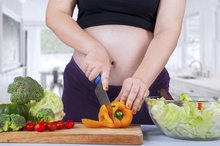Nutritional Needs at 14 Weeks Pregnant
At the 14th week of pregnancy, you are just heading into the second trimester. Many women feel better and have more energy during this phase of pregnancy. Your baby's growth really picks up during the second trimester, so this is no time to skimp on your nutrition. Your vitamin and mineral needs remain the same as in the first trimester, but your calorie needs will increase during this period of growth.
Calories
It's true that you are eating to nourish both you and your baby, but that certainly doesn't mean you need to eat double. At the 14th week of pregnancy, you need to consume a mere 340 calories more per day than you did before you were pregnant. Most women need 2,200 to 2,900 calories to achieve a healthy weight gain during pregnancy. Not only do you need extra calories during pregnancy, you need additional nutrients. So instead of using your extra 340 calories on a big bowl of ice cream, focus on including more nutrient-dense foods in your diet, such as fruits and vegetables, low-fat dairy products and whole grains.
- It's true that you are eating to nourish both you and your baby, but that certainly doesn't mean you need to eat double.
- At the 14th week of pregnancy, you need to consume a mere 340 calories more per day than you did before you were pregnant.
Protein
What Is the Difference in Nutrition for Infants Versus Other Stages of Life?
Learn More
Every cell and tissue in both your own body and your baby's needs protein. As you enter the second trimester of pregnancy, you need to increase your protein intake to support the rapid growth that is about to occur. You need to consume 0.5 grams of protein per pound of your prepregnancy ideal weight, plus an additional 25 grams. A woman with a healthy prepregnancy weight of 150 pounds would need 100 grams of protein per day during the second trimester.
- Every cell and tissue in both your own body and your baby's needs protein.
- You need to consume 0.5 grams of protein per pound of your prepregnancy ideal weight, plus an additional 25 grams.
Vitamin and Minerals
You are likely taking prenatal vitamins to increase your intake of important vitamins and minerals. However, supplements should never be a replacement for a healthy diet. A few of the nutrients that are especially important during pregnancy are folate, iron, vitamin A and calcium. According to the Institute of Medicine, you should be getting 600 micrograms of folate, 27 milligrams of iron, 770 micrograms of vitamin A and 1,000 milligrams of calcium every day. These recommendations for folate and iron are significantly higher than your prepregnancy needs. Foods that contain folate include spinach, lentils, broccoli and orange juice. To boost your iron intake, eat poultry, red meat, iron-fortified cereal, soybeans, spinach and dried beans.
- You are likely taking prenatal vitamins to increase your intake of important vitamins and minerals.
- These recommendations for folate and iron are significantly higher than your prepregnancy needs.
DHA
Does Your Metabolism Increase When You're Pregnant?
Learn More
Docosahexaenoic acid, commonly referred to as DHA, is an omega-3 fatty acid that plays an important role in fetal development, especially during the later months of pregnancy. DHA is necessary for visual and neurological development in the womb. Pregnant women need 200 to 300 milligrams of DHA per day to ensure optimal development. The best dietary sources of DHA are seafood, such as salmon, canned tuna and catfish. The 2010 Dietary Guidelines for Americans recommend you eat between 8 and 12 ounces of seafood per week while you're pregnant. Steer clear of seafood that may be contaminated with mercury, like king mackerel, swordfish, tilefish, walleye and bass, and limit albacore tuna to 6 ounces per week.
- Docosahexaenoic acid, commonly referred to as DHA, is an omega-3 fatty acid that plays an important role in fetal development, especially during the later months of pregnancy.
- The 2010 Dietary Guidelines for Americans recommend you eat between 8 and 12 ounces of seafood per week while you're pregnant.
Related Articles
References
- American Pregnancy Association: Nutrients and Vitamins for Pregnancy
- Expect the Best; Elizabeth M. Ward
- Nutrition Through the Lifecycle; Judith E. Brown
- Duggleby, S. L., & Jackson, A. A. (2002). Protein, amino acid and nitrogen metabolism during pregnancy: how might the mother meet the needs of her fetus? Current Opinion in Clinical Nutrition & Metabolic Care, 5(5), 503-509.
- Stephens, L. D., McNaughton, S. A., Crawford, D., & Ball, K. (2015). Nutrition promotion approaches preferred by Australian adolescents attending schools in disadvantaged neighbourhoods: a qualitative study. BMC Pediatrics, 15(1), 61.
- Elango, R., & Ball, R. O. (2016). Protein and Amino Acid Requirements during Pregnancy. Advances in Nutrition, 7(4), 839S-844S.
- Manta-Vogli, P. D., Schulpis, K. H., Dotsikas, Y., & Loukas, Y. L. (2018). The significant role of amino acids during pregnancy: nutritional support. The Journal of Maternal-Fetal & Neonatal Medicine, (just-accepted), 1-181.
- Stephens, T. V., Payne, M., Ball, R. O., Pencharz, P. B., & Elango, R. (2014). Protein Requirements of Healthy Pregnant Women during Early and Late Gestation Are Higher than Current Recommendations. The Journal of Nutrition, 145(1), 73-78.
- Blumfield, M. L., & Collins, C. E. (2014). High-protein diets during pregnancy: healthful or harmful for offspring?
- Forsum, E., & Lönnerdal, B. (1980). Effect of protein intake on protein and nitrogen composition of breast milk. The American Journal of Clinical Nutrition, 33(8), 1809-1813.
Writer Bio
Becky Bell is a registered dietitian with experience in the areas of diabetes, chronic kidney disease and general nutrition. Bell holds a Bachelor of Science in dietetics from Olivet Nazarene University and a Master of Science in human nutrition from the University of Alabama.









